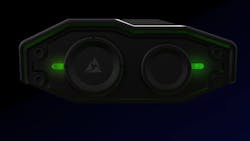Axon Says They'll Build In-Car License Plate Reader System With Ethical Design
SCOTTSDALE, Ariz., Oct. 23, 2019 /PRNewswire/ -- Axon (Nasdaq: AAXN), the global leader in connected public safety technologies, today announced that it is launching the industry's first AI-powered system built from the ground up using an ethical design and privacy-centric framework. Axon will integrate Automated License Plate Recognition (ALPR) technology into its next generation in-car video system, Axon Fleet 3, incorporating guidelines created by Axon's AI and Policing Technology Ethics Board. The company is announcing its AI-based ALPR capability 12 months ahead of initial deployments as part of a collaborative effort to define best practices and a model framework for implementation through conversations with leading public safety and civil liberties groups and the Ethics Board.
Axon and its Ethics Board will work with public safety thought leaders and diverse community leaders to develop a model framework for law enforcement agencies to responsibly and ethically deploy this technology consistent with the Ethics Board's guidance, which was set forth in their report published today.
"ALPR is an important tool for keeping communities safe as it can help apprehend criminals, find missing children, and recover stolen vehicles," says Axon CEO and founder, Rick Smith. "We do, however, recognize that there are legitimate concerns about privacy protections, constitutionality of search and data security issues that need to be addressed. We embrace that we have an ethical obligation to develop this technology thoughtfully and bring new privacy safeguards to the industry. While building ALPR, we'll be addressing items such as data retention and data ownership, creating an ethical framework to help prevent misuse of the technology."
Axon is leveraging the power of AI to significantly reduce the cost of ALPR systems, making it affordable for every patrol. Axon is simultaneously addressing industry short-comings to improve data security, transparency and privacy as declining costs enable more widespread use of the technology. Axon plans to work collaboratively with communities to better understand and implement controls such as maximum retention periods and transparency tools.
One recommendation in the Ethics Board's report calls for agency ownership and control over the captured license plate data, declaring that data should not be sold for commercial purposes. For years, Axon has protected digital evidence by maintaining a secure cloud-based system that allows agencies to control data, ensuring use only for public safety purposes. Consistent with the Ethics Board's recommendations, Axon will maintain that same high level of security and privacy standards with ALPR data.
"We have not, and will not ever sell public safety data. We believe the data is owned by public safety agencies and the communities they serve, and should not be resold to private entities whose interests may not be aligned with the public good," concluded Smith.
"The unregulated use of ALPRs has exposed millions of people subject to surveillance by law enforcement, and the danger to our basic civil rights is only increasing as the technology is becoming more common," says Ethics Board member Barry Friedman, founder of the Policing Project at the New York University School of Law and the Jacob D. Fuchsberg Professor of Law at New York University. "If government is going to continue to abdicate its responsibility to regulate this technology appropriately, and we hope it doesn't, it is incumbent on companies like Axon to ensure that ALPRs serve the communities who are subject to ALPR usage. This includes guardrails to ensure their use does not compromise civil liberties or worsen existing racial and socioeconomic disparities in the criminal justice system."
Axon Fleet 3 will use AI for ALPR to help reduce officer distraction. For example, when searching for stolen vehicles or criminals today, patrol officers manually look up vehicle license plates by typing into their computers. ALPR helps eliminate the need for typing while driving. Today, most agencies deploy ALPR via specialized vehicle units with plate recognition systems that cost tens of thousands of dollars in only a portion of the vehicle fleet. Axon Fleet 3 will integrate ALPR capability in the dashboard camera of every patrol vehicle, allowing agencies to deploy more coverage at a lower cost. Axon Fleet 3 will also enable Axon Aware real-time telemetry and video streaming capabilities and will be upgradeable to 5G to leverage low-latency connectivity for enhanced real-time services and direct video offload to the cloud.
Axon will be previewing Axon Fleet 3 at the 126th annual International Association of Chiefs of Police (IACP) conference, this week in Chicago at Axon's booth number 2211. There, Axon will be demonstrating enhanced 5G real-time services.
About Axon
Axon is a global network of devices, apps, training and people that helps public safety personnel become smarter and safer. With a mission of protecting life, our technologies give customers the confidence, focus and time they need to protect their communities. Our products impact every aspect of a public safety officer's day-to-day experience.
We work hard for those who put themselves in harm's way for all of us. To date, there are more than 397,800 software seats booked on the Axon network around the world and more than 223,000 lives have been saved with the Axon network of devices, apps, training and people. Learn more at www.axon.com or by calling (800) 978-2737.
Facebook is a trademark of Facebook, Inc. and Twitter is a trademark of Twitter, Inc.Axon, Axon Fleet, Axon Records, Axon Aware, Axon Detect and the Delta Logo are trademarks of Axon Enterprise, Inc., some of which are registered in the US and other countries. For more information, visit www.axon.com/legal. All rights reserved.SOURCE Axon



